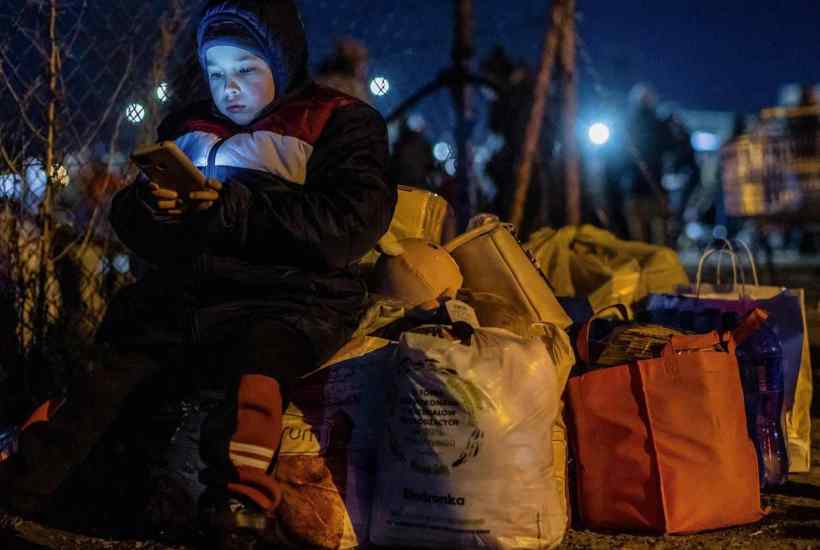Krakow
The invasion of Ukraine is being felt across Europe. Already hundreds of thousands of displaced Ukrainians are spilling out west in an attempt to flee Russian hostility. Polish society and the conservative government have, on the whole, supported refugees from their troubled eastern neighbour.
A recent poll shows that 53 per cent of Poles are in favour of taking in Ukrainian war refugees, compared to just 22 per cent against. In Germany, attitudes are more divided, with 41 per cent supporting the settlement of Ukrainian refugees compared to 38 per cent against. More than half of the supporters of the radical right nationalist Confederation party, whose detractors have long accused it of being pro-Putin, are in favour of bringing Ukrainian refugees to Poland. Meanwhile, Poland’s deputy defence minister Marcin Ociepa has pledged to take in ‘as many refugees as possible’.
In recent years, Poland has seen a large influx of immigrants, primarily Ukrainians and Belarusians (with smaller numbers from other post-Soviet states, particularly Georgia and Moldova) – although East Asians are also a growing presence; it is not uncommon to see Indian migrants playing cricket in Warsaw’s parks. Each day, the bazaar on Warsaw’s Bakalarska Street is populated by Vietnamese vendors who sell not only cheap clothes but also pho and durians, foods which until recently few Poles had ever heard of. Meanwhile, every urban Pole will tell you his or her favourite Georgian pastry shop or which Georgian bistro in Warsaw, Krakow, or Gdansk has the finest kharcho soup. In 2020, Poland granted nearly 600,000 residence permits to non-EU citizens, twice the number provided by Germany, which has more than double Poland’s population.
About 1.5 million Ukrainians already live in Poland, especially in the big cities. A Ukrainian barber cuts my hair before I head off to teach numerous Ukrainian students. Although this is lost to Anglophone visitors to Poland, it is an everyday occurrence to hear waiters or shop clerks serving clients with melodic Ukrainian accents.
This movement has been encouraged by the Law and Justice government. Last autumn, for example, it amended Poland’s labour law, eliminating numerous bureaucratic barriers hindering migrant labour in the country.
All these developments go against the general western view that Poland is ruled by chauvinists. Yes, many Poles are sceptical of mass immigration. Perhaps some of this reluctance results from the fact that Poland has historically been the antechamber of Christendom. which successfully defeated European civilisation against the Ottomans at Vienna in 1683 and the Bolsheviks at Warsaw in 1920. Most are motivated not by racism but by a desire to avoid the mistakes of Western European Multikulti, which for decades has welcomed large numbers of immigrants from different cultures without asking that they accept the values of their host countries. This view was articulated by Jarosław Gowin, until recently deputy prime minister of Poland, who after a 2017 terrorist attack in London said:
We are dealing with a clash of civilisations. A Ukrainian who commits a crime in Poland or a Pole committing a crime in Ukraine is a mere criminal. That is not a conflict of values. Yet the man who murdered several people in London did so because he professes belief in Allah and the belief that people with different views can be killed.
By contrast, immigrants from the former USSR – coming from Christian cultures, the speakers of Slavic languages who quickly master Polish, and widely seen as hard workers – have successfully assimilated into Polish society; the growing number of Polish-Ukrainian marriages attests to this much: between 2015 and 2018, the number of marriages between Poles and foreigners (mostly Ukrainians) soared by 38 per cent.
In recent years, Polish society has been brutally atomised and polarised on a host of socio-political issues: the reform of the judiciary, social issues such as abortion, environmental policy, relations with Russia. Yet Poles are coming together in support for Ukrainians in need, from the nationalist right to the post-communist left.
Got something to add? Join the discussion and comment below.
Get 10 issues for just $10
Subscribe to The Spectator Australia today for the next 10 magazine issues, plus full online access, for just $10.



















Comments
Don't miss out
Join the conversation with other Spectator Australia readers. Subscribe to leave a comment.
SUBSCRIBEAlready a subscriber? Log in